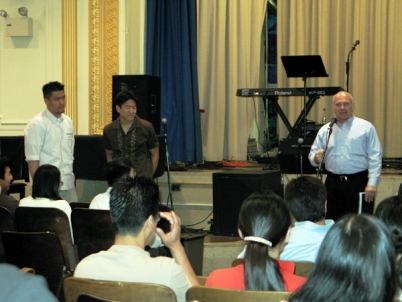Commitment to Scripture
August 19, 2009
 |
My friends have often heard me say, “The more I read my Bible the less dispensational I become.” This statement comes from someone who was spiritually nurtured in churches with dispensational theology, who graduated from a Christian university steeped in dispensational theology, who received his first graduate degree from a dispensational seminary, and who—for twelve years—preached sermons that reflected dispensational theology. For the first sixteen years of my Christian life, I rarely questioned the fundamental distinctions of dispensational theology. What are those distinctions? In his discussion of what he called the “sine qua non of dispensationalism,” Ryrie asserted:
A dispensationalist keeps Israel and the Church distinct … This is probably the most basic theological test of whether or not a man is a dispensationalist, and it is undoubtedly the most practical and conclusive (Ryrie 44-45). Later he concluded, “the essence of dispensationalism, then, is the distinction between Israel and the Church” (Ryrie 47).
As a dispensationalist I studied my Bible with the understanding that God had dual and separate plans for Israel and the church. I understood this “church age” to be somewhat parenthetical until God resumed His plan with the nation of Israel. I believed that the Abrahamic covenant and all the other Old Testament covenants were essentially for national Israel, and that only the soteriological benefits of the covenants belonged to the church.
As I continued to pastor and preach, I realized that my training in the Old Testament was weak. I decided to pursue a Master of Theology in Old Testament at Westminster Theological Seminary. My dispensational comrades in ministry assured me that Westminster would ruin my theology. I suppose many of them believe that has happened. Nevertheless, I was drawn to Westminster primarily because Bruce Waltke was teaching there. I had read books and articles by Dr. Waltke and had profited immensely from them.
While at Westminster I had the privilege of learning from Vern Poythress, Tremper Longman, and Raymond Dillard, along with Bruce Waltke. At first I listened as an antagonist, but I was soon won over by their personal graciousness and their commitment to Scripture. I began to experience discomfort as I realized that my commitment to dispensationalism was often unyielding, even when contradicted by the results of exegesis. These words from the introduction to my Th.M thesis summarize my response at that time:
"Exegesis often eviscerates one’s theological presuppositions. When a theological bulwark withstands the penetration of biblical exegesis, its tenets remain secure. However, if its walls crumble beneath the weight of incisive and precise exegesis, then one must abandon the fortress and construct a better one" (Davis, 1990, 1).
During the course of my study at Westminster, Bruce Waltke was my faculty advisor. I was privileged to have a number of personal discussions with him regarding the uneasiness I felt in questioning dispensationalism. As I considered what to research for my Th.M thesis, he suggested a topic that would be beneficial to me on my journey and helpful to others. I wrote “A Critical Evaluation of the Use of the Abrahamic Covenant in Dispensationalism.” The writing of that thesis opened a door and gave me a gentle push toward my eventual departure from dispensationalism.
As I worked through the exegesis of the Abrahamic Covenant and the hermeneutical issues surrounding it, I came to this conclusion:
"Through an inductive study, this paper has arrived at a position that approximates covenant theology, namely, that that covenants confirm and explicate the program by which God redeems a people for Himself. It has been established that Israel and the church need to be perceived as sub-categories of a larger concept, i.e. the people of God. The Abrahamic covenant is not the beginning of the people of God, but rather God’s redemptive means, after the rebellion at Babel and the dispersion, to reclaim a fallen world to Himself. The Abrahamic covenant needs to be viewed in its relation to God’s purposes for the entire world, not simply His purposes for a nation. The Abrahamic covenant needs to viewed in light of the inauguration of eschatological times with the first advent of Jesus Christ, as well as the consummation of eschatology at the second advent" (Davis 109).
Read the rest of Dr. Davis' testimony.
On Sunday, May 24, 2009, Pastor Davis shared with the church his passion and vision to return to the city of Philadelphia where he was raised and to join with his brother, Steve, in launching a church planting movement in that city. Over the next few months, Pastor Davis and the elders will work on the transition to new pastoral leadership, so as to ensure continuity with the mission and values of GFC. We ask for your prayers in this challenging time, in which we will depend on the Lord for His direction and provision, both for Grace Fellowship Church of Queens and what will be Grace Church of Philly.
The message on May 24th, in which Pastor Davis talked about Christ as the church's only foundation,
also contains his comments about his call to Philadelphia (beginning at about the 40-minute mark). Please pray for Dr. Davis' transition back to Philadelphia.







